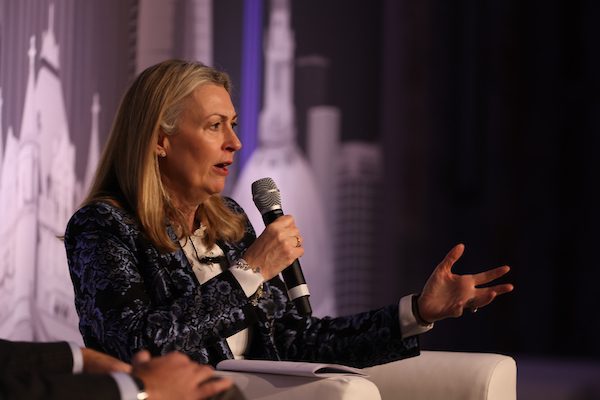Fidelity International: It’s a Problem that Regulators Around the World Look at Crypto Differently
Fidelity’s Anne Richards argues that while digital asset volatility is a challenge and regulations are coming, along with CBDC, ultimately these developments are both necessary and beneficial for adoption.

Anne Richards, Fidelity International CEO; Source: Ian Walton for Blockworks
- The financial system has never stopped changing, and digital assets will likely be a central part of this next wave of innovation
- Some regulation is necessary; too much regulation can be a drag
Digital Asset Summit 2021, London — Greater oversight from regulators of the digital asset industry across the world is going to be essential in getting institutional players involved, Anne Richards, CEO of Fidelity International said.
“It is clear that regulators around the world are taking a somewhat different approach on this and so and that is an impediment to conservative institutional investors, no doubt about it,” Richards said during a keynote address at Blockworks’ Digital Asset Summit in London Tuesday, noting that traditional financial players will likely be more comfortable with greater oversight.
That is not to say, Richards said, that there is no such thing as too much regulation, because there is, in Richards’ opinion.
“We don’t need them to regulate everything, we don’t want them to regulate everything, but allow them to regulate enough so that more cautious institutional investors can get involved.”
Volatile markets are a mixed bag
Digital assets present a new array of challenges for institutional investors. Richards said. Crypto moves largely independently of traditional markets and other asset classes, and its volatile nature can be daunting for new players as well as regulators.
“I think the volatility is something that remains something of a challenge because the 60/40 portfolio…it has been a challenge for many asset allocators, the correlations have gone up over time, and it doesn’t provide the same diversification benefits that historically it did,” Richards said.
“Now crypto assets bring a very different dynamic into that, so they behave differently to conventional assets, whether that remains true over time if they become more and more owned by the same investors, is an interesting point.”
 Anne Richards; Source: Ian Walton for Blockworks
Anne Richards; Source: Ian Walton for BlockworksThe role of CBDC in an evolving financial system
Central bank digital currencies (CBDCs) will be an intriguing aspect of getting institutional players involved, Richards said. She, like several other DAS London speakers, sees a major increase in CBDCs in the next five years.
There will of course be implications of CBDCs, Richards said, and these will have to be considered carefully. Governments would be granted far more power and oversight over how citizens spend money and manage their finances.
“Programmable money is a really profound change that might make all sorts of things dramatically more frictionless than they are today,” Richards said.
“On the other hand, there are some real challenges about what that means for how much personal freedom, how much personal information actually potentially, are you giving up to the provider of that central currency.”
The conversation around institutional adoption of and involvement in cryptocurrencies oftentimes does not take into account the mutability of the current financial system, Richards said. From the creation of cash to electronic payments, the financial system has never stopped changing, and digital assets will likely be a central part of this next wave of innovation.
“I actually view the evolution of the financial system that we have today as one of the great viral innovations,” Richards said. “The financial system has been pretty adaptive for quite a long period of time.”
Get the day’s top crypto news and insights delivered to your inbox every evening. Subscribe to Blockworks’ free newsletter now.






